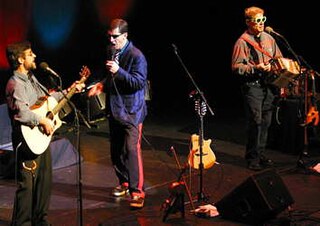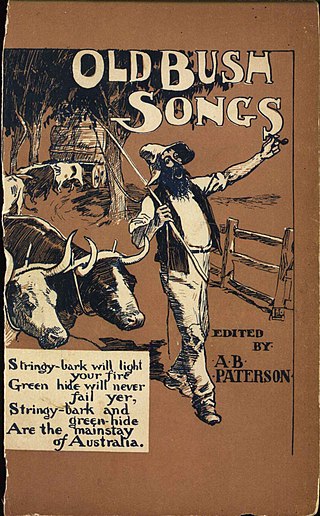
Shaye was a Canadian pop group, consisting of singer-songwriters Kim Stockwood, Damhnait Doyle and Tara MacLean. MacLean left the group in 2007 and the band folded by 2009. The band is named after MacLean's sister who died in a car accident in 2002.

Buddy Wasisname and the Other Fellers is a musical and comedy trio from Newfoundland and Labrador, founded in 1983 and composed of Kevin Blackmore, Wayne Chaulk, Byron Pardy and Ray Johnson. The group specializes in Newfoundland and folk music, and performs comedic skits and stand-up routines.

Alan Thomas Doyle is a Canadian musician and founding member of the Canadian folk rock band Great Big Sea.

Kim Stockwood is a Canadian pop musician, singer and composer originally from St. John's, Newfoundland and Labrador. She has recorded as a solo artist and also as a member of Atlantic Canadian music group Shaye with Damhnait Doyle and Tara MacLean.
In the province of Nova Scotia in Canada, Celtic music has played a significant role, both in its traditional forms and fused with other musical styles. Nova Scotia's folk music features traditional tunes brought over from the Scottish Highlands in the late 18th and early 19th centuries, as well as localized forms such as Cape Breton fiddle music. In recent years, a wide variety of other musical genres have emerged in Nova Scotia, which has produced several country music stars such as Hank Snow, Wilf Carter, Anne Murray, and Rita MacNeil.
Figgy Duff was a Canadian folk-rock band from Newfoundland, Canada. They played a major role in the Newfoundland cultural renaissance of the 1970s and 1980s. Formed in 1976 by Noel Dinn, who named the band after a traditional pudding, Figgy Duff travelled across Newfoundland, learning traditional songs and performing them with distinct elements of rock and roll.

Celtic music is primarily associated with the folk traditions of Ireland, Scotland, Brittany and Wales, as well as the popular styles derived from folk culture. In addition, a number of other areas of the world are known for the use of Celtic musical styles and techniques, including Newfoundland, and much of the folk music of Canada's Maritimes, especially on Cape Breton Island and Prince Edward Island.
Celtic rock is a genre of folk rock, as well as a form of Celtic fusion which incorporates Celtic music, instrumentation and themes into a rock music context. It has been prolific since the early 1970s and can be seen as a key foundation of the development of successful mainstream Celtic bands and popular musical performers, as well as creating important derivatives through further fusions. It has played a major role in the maintenance and definition of regional and national identities and in fostering a pan-Celtic culture. It has also helped to communicate those cultures to external audiences.

Great Big Sea is the self-titled debut album by Canadian folk-rock band Great Big Sea released in 1993. Originally released in 1993, it was later redistributed by Warner Music Canada when the band was signed.

Ryan’s Fancy was an Irish folk music group active from 1971–1983. The band consisted of multi-instrumentalists Denis Ryan, Fergus O'Byrne, and Dermot O'Reilly, all of whom were Irish immigrants to Canada.

RobertHallett is a Canadian musician, author, producer, and entrepreneur, best known as a founding member of the Canadian folk rock band Great Big Sea (1993–2013). He is also a native of St. John's, Newfoundland, Hallett co-founded Great Big Sea in 1993, with Alan Doyle, Sean McCann, and Darrell Power. The band sold over a million and half records around the world, over a twenty-year period. Through his company, Kilbride Music, Hallett has managed bands and produced records, radio specials, and live concerts. Hallet is a vocal proponent of talent development within the Newfoundland and East Coast Music Industries, and has authored a career guidebook for aspiring musicians. He works with the producers of the Broadway musical Come From Away as a Music Consultant, and has also worked at the Stratford Festival as a Composer & Music Director. As an author he has written dozens of magazine articles, essays and several books, including the best-selling memoir Writing Out The Notes. He is the owner of Erin's Pub and Tavola Restaurant in downtown St. John's. Hallett currently plays accordion and other instruments in the band Kelly Russell and the Planks; he has also been associated with The Once, The Dardanelles, Fabian James, and the Irish Descendants, in various capacities.
D'Arcy Broderick is a Newfoundland musician who plays fiddle, guitar, mandola, banjo, accordion and mandolin. He is best known as a former member of the popular Irish-Newfoundland bands The Irish Descendants and The Fables. He is currently performing around Newfoundland with the band Middle Tickle. Alongside of him in the band are: William Broderick (Drums), Glenn Hiscock, Paul Hiscock and the only remaining original band member Ron Kelly. Glen Hiscock and William Broderick are occasionally absent from the weekly show Middle Tickle plays at Shamrock City Pub. Broderick was one of the owners of Shamrock City Pub, located in Downtown St. John's, Newfoundland. He left Shamrock City in 2017 and opened a new and traditional Irish pub named Broderick's Pub, situated at 201 Water Street in St. John's, in January 2020.

Simani was a Newfoundland and Labrador musical duet considered the cornerstone of traditional Newfoundland music. Formed in 1977 by Bud Davidge and Sim Savory, in Belleoram, Fortune Bay, their music keeps Newfoundland's unique heritage alive by putting old stories to song and by their recording of local jigs and reels. Their music is characterized by the folksy sound of their native province, including Celtic, English, and French influences.

Ron Hynes was a folk singer-songwriter from Newfoundland and Labrador. He was especially known for his composition "Sonny's Dream", which has been recorded worldwide by many artists and was named the 41st greatest Canadian song of all time on the 2005 CBC Radio One series 50 Tracks: The Canadian Version.

Otherworld is an album by Lúnasa that was released 1999 on Green Linnet Records. It is the band's second major release. Although the album displays the band’s traditional Celtic sound, it features techniques and styles unusual to the genre, such as occasional double-tracking recording and occasional instances of instruments that differ from Celtic music, such as cello, electric bass and flügelhorn, leading Allmusic to say the album "yields a sound that is unique to the group and yet clearly in touch with tradition". The album has been described as innovative, with The Georgia Straight citing several tracks' usage of multiple woodwinds as an example.
The Irish Descendants are a folk group from St. John's, Newfoundland and Labrador, Canada. All the members, born of Irish emigrants, were workers in the Newfoundland fishing industry before forming the band in 1990 out of the remnants of two former Newfoundland bands – The Descendants and Irish Coffee. The group helped to popularise traditional Newfoundland music to a wider Canadian audience in the early 1990s, along with other bands such as Great Big Sea. Their popularity within the province itself led to their selection as the official band of the province's 500th anniversary celebrations, during which they performed for the Queen. Tension within the group caused co-frontman D'Arcy Broderick to leave soon after this period, and their lineup has frequently changed since then, with frontman Con O'Brien being the only constant member. Regular touring and occasional album releases, most recently Is your Rhubarb Up in 2018, have kept the group in the public eye.

Australian folk music is the traditional music from the large variety of immigrant cultures and those of the original Australian inhabitants.

Franco-Newfoundlanders, also known as Franco-Terreneuvians in English or Franco-Terreneuviens in French, are francophone and/or French Canadian residents of the Canadian province of Newfoundland and Labrador. The name Franco-Terreneuvian derives from Terre-Neuve, the French name of Newfoundland.
Music of Canadian Cultures is a wide and diverse accumulation of music from many different individual communities all across Canada. With Canada being vast in size, the country throughout its history has had regional music scenes. The music of Canada has reflected the multi-cultural influences that have shaped the country. First Nations people, the French, the British, the United States and many others nationalities have all made unique contributions to the musical heritage of Canada
Wilf Doyle was a Canadian folk musician, generally regarded as one of the pioneers of accordion music of Newfoundland. In 2007, the Newfoundland and Labrador Folk Festival gave him a Lifetime Achievement Award.












